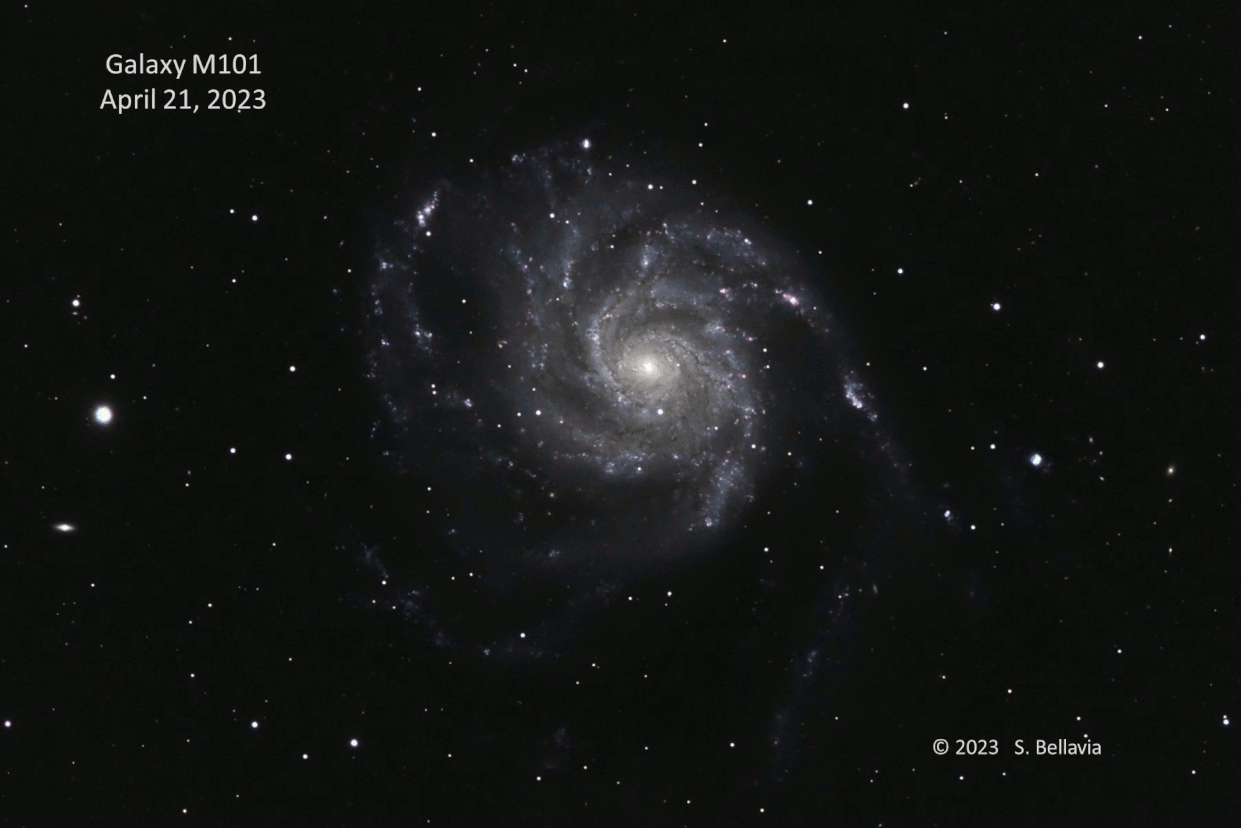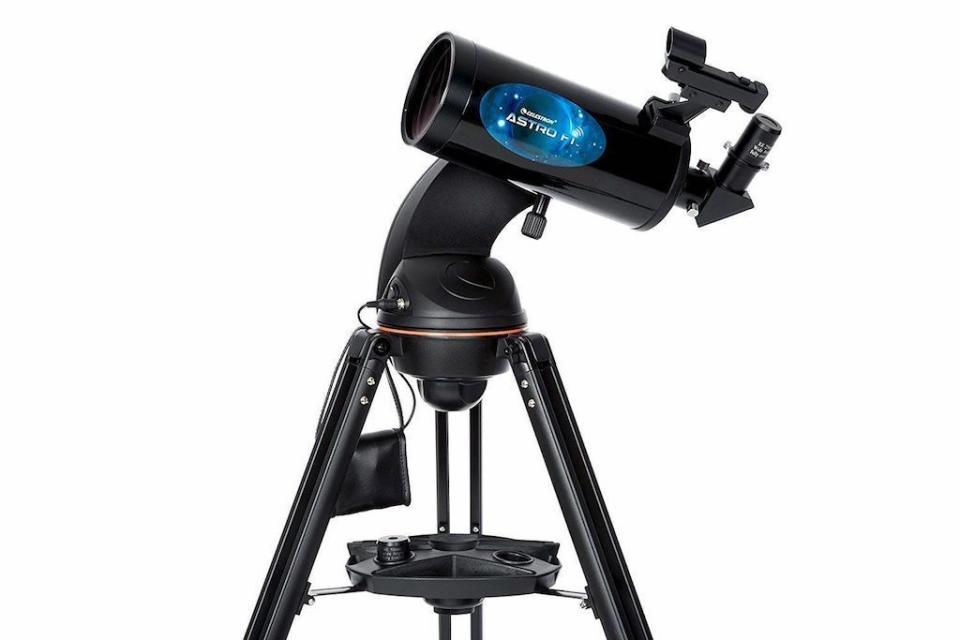New supernova thrills astronomers and skywatchers around the world (photos)

Astronomers and amateurs alike are excited about a new star explosion visible in small telescopes.
The new supernova popped into visibility on May 19 in the Pinwheel Galaxy, (also designated as Messier 101, or M101). The galaxy is visible in a small telescope under dark-sky conditions, as long as you use a wide field of view and a low-power eyepiece.
Supernova hunter Koichi Itagaki, from Yamagata, Japan, first spotted the explosion, which was confirmed the following day (May 20) by telescopes of the Zwicky Transient Facility (ZTF) in California.
Related: This new supernova is the closest to Earth in a decade. It's visible in the night sky right now.
TOP TELESCOPE PICK:

Looking for a telescope to observe the Pinwheel Galaxy other awesome sights in the night sky? We recommend the Celestron Astro Fi 102 as the top pick in our best beginner's telescope guide.
Long-exposure photographs make the supernova easier to spot. The supernova was formed when a star, much more massive than our own sun, ran out of fuel to burn in its core. Since the core could not support the mass of the star any more, the star collapsed on itself and created a gigantic explosion.
Several observers shared their excitement on Twitter, often aided by imagery or data as they talked about the supernova with the public.
The Search for Extraterrestrial Intelligence (SETI) Institute in Mountain View, California joined several amateur astronomers in providing footage of the supernova, which is easily visible in amateur telescopes.
https://t.co/w8ruiGdwXG @UnistellarOn May 19th, a bright supernova - #SN2023ixf - was discovered in the spiral arms of the Pinwheel Galaxy, aka M101. The best part about SN 2023ixf? You can join in observing it along with the rest of the Unistellar Network! pic.twitter.com/IxdtqYTdLVMay 24, 2023
Look in the upper arm of this galaxy- you'll see a star appear to blink in and out of existence. That's a supernova! Very recently discovered in m101: the Pinwheel galaxy (which I happened to be shooting when this happened) pic.twitter.com/8hvplfXNtdMay 20, 2023
🛑Supernova 🎇SN #2023ixf in Messier 101: hi-res image from last night (23 May 2023)..🔭Details here: https://t.co/nVBwsmtq5c pic.twitter.com/NgIBhcP3s2May 24, 2023
M101 with SUPERNOVAOnly 2 hours of 4 min sub exposures. But there is supernova SN2023ixf ! 5” scope and a Nikon d5300. Data from Robert Eckheart. @nasahqphoto @ThePhotoHour #StormHour @DavidBflower @SkyandTelescope @AstronomyMag #Astrophotography #astronomy #SUPERNOVA pic.twitter.com/L7ejrB3BVqMay 25, 2023
Professional astronomers shared data or alerted the community about the rare event, which may be a little hard to spot if you're not used to looking for such things.
"Just note that this galaxy and supernova aren't the easiest objects to spot in the sky," Space.com writer Joe Rao wrote in a recent story.
"Part of the reason for its visibility being problematic is its apparent size: M101 is roughly one-third the apparent diameter of the moon; thus its overall brightness is 'spread out' to such a degree that the contrast between it and the background sky makes it somewhat difficult to perceive."
If you want to look at M101 or any other deep-sky objects, our guides to the best telescopes and best binoculars are a great place to start. We can also help you take pictures of this new supernova with our guides to how to photograph the moon, as well as the best cameras for astrophotography and best lenses for astrophotography.
The sky cleared up tonight just enough to spot the newly discovered supernova in M101 (2023ixf). It’s a challenge from my light-polluted site in an 8-inch scope. I ballparked it as no brighter than V = +12.2.📷: me trying to figure it out in my notebook with comparison stars pic.twitter.com/GAk2v3vgtuMay 21, 2023
🚨SUPERNOVA ALERT 🚨: SN2023ixf was just discovered a few hours ago in the Pinwheel Galaxy, M101! At 21 million light years away it’s the closest supernova in a decade- currently rising rapidly and should be viewable soon in amateur telescopes!https://t.co/IRT53TXFRS pic.twitter.com/UXulMeHiRXMay 20, 2023
Several folks commented on how smoke from huge wildfires in Canada's west affected observations, but the supernova was nevertheless still visible through the haze.
Damn that supernova is bright. Single 60 sec exposure under pretty bad smoke and not well focused. #astronomy #Astrophotography #SN2023ixf pic.twitter.com/acNL25KVT2May 24, 2023
The supernova in Pinwheel Galaxy M101! Returned from vacation. Had a quick look last night. View condition was not good due to the smoke, but the supernova is easy to see. 🔭ED127📷asi1600mm processed in HaRGB in PI. Enjoy! #Astrophotography #supernova #SN2023ixf #Space pic.twitter.com/WmB85mPL1jMay 25, 2023
Related stories:
— Supernova photos: Great images of star explosions
— Night sky, May 2023: What you can see tonight (maps)
Some folks used the opportunity to comment on activities by SpaceX and its billionaire CEO, Elon Musk.
SpaceX has sent more than 4,000 Starlink broadband spacecraft into orbit to date, and the company has been criticized for the satellites' effect on amateur astronomy as they cross in front of objects.
Breaking my Twitter moratorium to make sure astronomers are aware there is a new supernova in M101 at 7 Mpc. It is a core collapse supernova caught very young, at 14.9 mag. Supernovae this close only come around once a decade, so get on it! https://t.co/s3a6CuxLMdMay 19, 2023
Nothing like a piece of Elon Musk space junk to ruin a livestack of a supernova image. pic.twitter.com/wtSqLzYPWFMay 24, 2023
Editor's Note: If you manage to take a photo of M101 and/or this new supernova and would like to share it with Space.com's readers, send your photo(s), comments, and your name and location to spacephotos@space.com.

